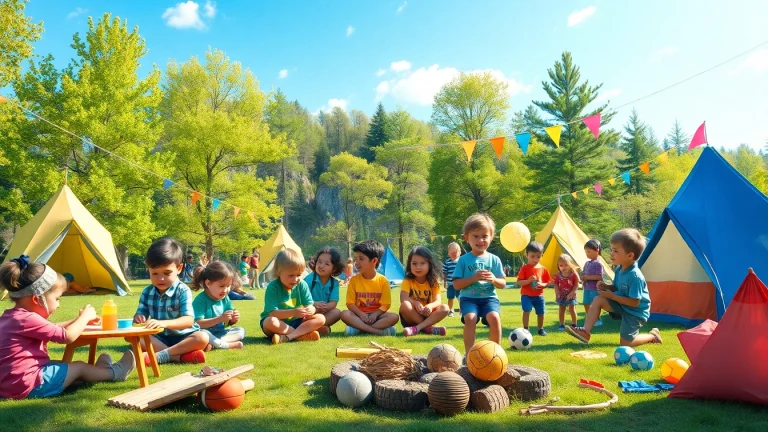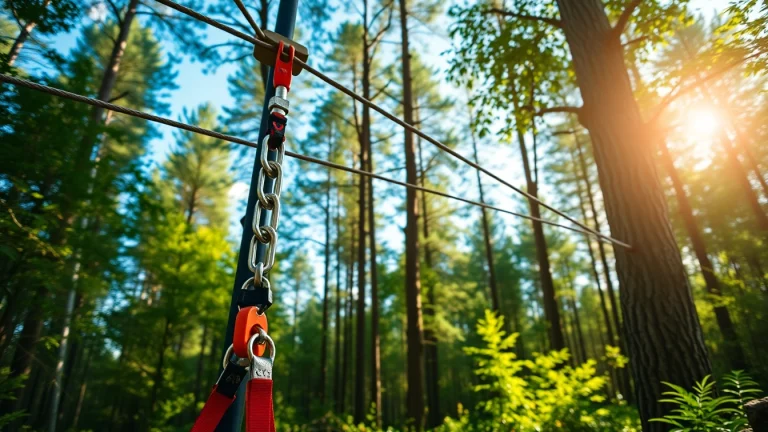
Unforgettable Holiday Camps: Create Lifelong Memories for Kids
Understanding Holiday Camps: What They Are and Why They Matter
Holiday camps offer a unique blend of fun, learning, and socialization for children during school breaks. Parents often look for holiday camps as a way to keep their kids engaged, active, and entertained while fostering valuable life skills. But what exactly are these camps, and how do they benefit children as well as parents? In this comprehensive guide, we’ll explore the various aspects of holiday camps, helping you understand their importance and how to select the best options for your family.
Definition and History of Holiday Camps
The term “holiday camp” traditionally refers to a place where groups of people can stay during their vacation, typically characterized by various leisure activities, entertainment, and accommodations. Originating in the United Kingdom in the 1930s, early holiday camps like Butlins and Warner Leisure Hotels were designed to provide an all-inclusive resort experience for families and friends. These facilities focused on a collective experience, encouraging group activities, communal meals, and entertainment that captivated children and adults alike.
Over the decades, holiday camps have evolved, expanding their offerings and adapting to changing consumer preferences. Today, they encompass a diverse range of programs, including summer camps, winter camps, school break camps, and specialized camps that focus on arts, sports, or other interests.
Types of Holiday Camps Available Today
There are several types of holiday camps to choose from, catering to various interests and age groups. Below are some common categories:
- Traditional Holiday Camps: These typically include accommodations, meals, and a variety of organized activities such as sports, games, and arts and crafts.
- Sports Camps: Focus on physical activities and skill development in specific sports like soccer, basketball, or gymnastics.
- Arts Camps: Nurture creativity through drama, music, visual arts, and other artistic expressions.
- Educational Camps: Offer learning opportunities in areas like science, technology, engineering, mathematics (STEM), and environmental education.
- Adventure Camps: Focus on outdoor pursuits such as hiking, rock climbing, or canoeing, emphasizing teamwork and resilience.
- Cultural Camps: Provide immersive experiences in different cultures, including food, language, and traditions.
Benefits of Attending Holiday Camps for Children
Holiday camps present numerous advantages for children, ranging from social skills development to physical activity. Here are some key benefits:
- Social Skills Development: Camps provide an environment for children to interact with peers, fostering friendships and helping them learn teamwork, communication, and conflict resolution.
- Independence: Attending a holiday camp encourages children to step out of their comfort zone, develop self-reliance, and cultivate problem-solving skills.
- Physical Activity: Many camps emphasize outdoor activities, encouraging kids to stay active and promoting physical health through play and exercise.
- Expanding Horizons: Camps often introduce children to new hobbies and interests, helping them discover hidden talents or passions.
- Building Confidence: Participation in various activities and overcoming challenges at camp can significantly boost a child’s self-esteem.
Choosing the Right Holiday Camp for Your Child
Finding the perfect holiday camp for your child can be overwhelming with numerous options available. Here are some strategies to help you make an informed decision.
Factors to Consider When Selecting a Camp
When searching for a holiday camp, consider the following factors:
- Age Appropriateness: Ensure the camp caters to your child’s age group and developmental stage.
- Location and Logistics: Consider how far the camp is from your home, transportation options, and whether it offers overnight or day sessions.
- Duration: Camps may last from a few days to several weeks. Choose one that fits your schedule.
- Cost: Evaluate your budget and what is included in the camp fees.
- Reputation and Reviews: Research the camp’s reputation by checking reviews from other parents and contacting previous attendees if possible.
Top Features to Look for in Holiday Camps
Here’s a list of desirable features that can enhance your child’s holiday camp experience:
- Diverse Activities: A camp should offer a range of activities to engage children and promote exploration.
- Qualified Staff: Look for camps with trained and experienced counselors who prioritize child safety and well-being.
- Safety Protocols: Safety measures, including first aid training and emergency protocols, are essential for peace of mind.
- Small Group Sizes: Camps should maintain a reasonable camper-to-counselor ratio to ensure personalized attention and supervision.
- Feedback and Communication: The best camps communicate regularly with parents about their child’s experience.
How to Compare Different Holiday Camps
To effectively compare different holiday camps, create a pros and cons list for each. Consider factors such as price, location, amenities, staff qualifications, and the activities offered. It’s also beneficial to visit potential camps during open house days to get a feel for the environment and meet counselors. Additionally, talking to other parents who have sent their children to the camps you’re considering can provide valuable insights.
Engaging Activities at Holiday Camps
One of the main attractions of holiday camps is the wide array of engaging activities they offer. Let’s dive deeper into the types of activities children can experience at these camps.
Fun Physical Activities: From Sports to Outdoor Adventures
Physical activities are a cornerstone of holiday camps, promoting fitness and teamwork. Typical offerings may include:
- Team Sports: Soccer, basketball, and volleyball are common, teaching kids the importance of teamwork and strategy.
- Outdoor Adventures: Hiking, canoeing, and rock climbing provide an adventurous element, fostering a love of nature and the outdoors.
- Obstacles Courses: Many camps design playful obstacle courses that challenge physical abilities while having fun.
These activities not only keep children physically active but also help them develop coordination and self-discipline.
Creative Expression: Arts and Crafts at Camps
For children with a penchant for creativity, holiday camps often feature arts and crafts sessions that allow for self-expression. Activities may include:
- Painting and Drawing: Camps often provide various supplies and guidance, allowing children to unleash their artistic talents.
- Craft Projects: Children can engage in projects such as jewelry making, woodworking, or sculpting, teaching them patience and precision.
- Theatre and Dance: Many camps offer performing arts, enabling kids to express themselves through drama and movement.
Educational Programs: Learning Through Play
Holiday camps don’t solely focus on play; many integrate educational experiences into their programs. This may include:
- STEM Activities: Camps may offer workshops on coding, robotics, or experimental science, making learning fun.
- Environmental Education: Programs may also emphasize ecological awareness through nature walks and conservation projects.
- Historical Reenactments: Camps sometimes recreate historical events, providing a hands-on learning experience.
These educational programs help children learn important concepts without them even feeling like they are in a classroom setting.
What Parents Can Expect from Holiday Camps
Parents play an important role in ensuring a smooth holiday camp experience for their children. Here’s what you can expect.
Counselor Qualifications and Safety Protocols
When selecting a holiday camp, it’s important for parents to inquire about counselor qualifications. Camps should employ staff who have undergone background checks, relevant training, and first aid certifications. Safety protocols, including supervision during all activities and emergency procedures, should be clearly communicated to ensure parents feel secure about their child’s well-being.
Communicating with Kids: Staying Connected During Camp
Understanding that parents may worry about their children’s adjustment to camp life, many camps now offer various communication options. This may include:
- Daily Updates: Regular newsletters or social media updates can keep parents in the loop.
- Technology Access: Some camps allow campers to send emails or postcards home to share their experiences.
- Parent-Counselor Communication: Encouraging parents to have direct lines of communication with counselors fosters transparency.
Post-Camp Integration: Keeping the Memories Alive
The camp experience doesn’t end when the final bus departs. Here are some ways to keep the camp spirit alive:
- Discussion: Engage with your child about their favorite memories, activities, and new friends made during camp.
- Camp Keepsakes: Encourage children to display their artwork or craft projects at home as reminders of their camp experience.
- Future Planning: Talk about potential camps for the next holiday. This builds excitement and encourages ongoing engagement with their interests.
Success Stories: How Holiday Camps Change Lives
The impact of holiday camps extends far beyond the short duration of the program. Numerous success stories exist that highlight the lasting benefits of these experiences.
Testimonies from Parents and Campers
Many parents express profound gratitude for the transformative experiences their children have at holiday camps. Testimonials often highlight:
- Social Growth: Parents note their children returning with increased confidence and improved social skills, showcasing the power of group dynamics.
- Skill Development: Kids often come back excited about new interests, such as sports or the arts, that they may not have explored otherwise.
- Lasting Friendships: Many campers forge friendships that extend beyond the camp experience, leading to life-long bonds.
Statistics on Benefits of Holiday Camp Participation
Research indicates several positive outcomes for children attending holiday camps. Studies show that children who participate in camps are:
- 50% more likely to develop leadership skills.
- 30% more inclined to engage in extracurricular activities in school following their camp experience.
- 65% report increased self-esteem and confidence.
These statistics represent how impactful holiday camps can be for overall child development.
Long-Term Friendships Formed at Camps
Friendships formed during childhood often leave lasting impressions. Many adults fondly recall friends they made at camp and cherish those connections throughout their lives. The shared experiences of adventure, teamwork, and fun foster bonds that can last a lifetime.


